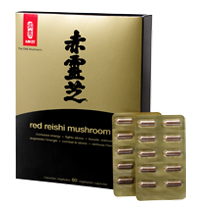Christine Cheng, B.Sc.(Pharm) & Dr. Henry Cheng
There are two categories of mushrooms, namely culinary mushrooms used for food and medicinal mushrooms used for promoting health. Medicinal mushrooms include Maitake mushroom (Grifola frondosa), Shitake mushroom (Lentinus edodes), Cloud mushroom (Coriolus versicolor), Cordycept (Cordyceps sinensis), and Reishi mushroom (Ganoderma lucidum). These mushrooms contain polysaccharides, beta-glucans, triterpenes, ganoderic acid, amino acids, and other phytonutrients that have many effects such as antioxidant, antitumor, immune-modulation, cardiovascular, antiviral, and antibacterial effects. Some of these have been used in the Orient for 4000 years. Among the medicinal mushrooms, Reishi mushroom is regarded by the Chinese and the Japanese as the king of herbs. In fact the Chinese call it “Ling Zhi” which translates to “Miraculous herb from Heaven”. Among the many species of Reishi, the most valued is the Red Reishi as it has the highest content of immune factors which incidentally accounts for its bitter taste. In ancient China, Reishi was used by royalties for longevity, vitality, fertility, toxic states, and in fact for any stubborn illness. Many a time it was used as a last resort when all else failed. In modern medicine, Red Reishi is regarded as an adaptogen. It normalizes the body’s own immunity and it enhances the body’s ability to adapt to internal and external stress such as any illness, fatigue and anxiety. Through improved adaptability, the body will experience increased energy, decreased stress levels, improved sleep, more stable mood, better circulation and improved blood pressure readings. It is most valuable in asthenic individuals with low blood pressure, pallor, and poor circulation. Red Reishi may also be beneficial in high cholesterol, asthma, diabetes and blood pressure problems. Due to its ability to enhance glutathione metabolism, Red Reishi may also have a role in detoxification reactions. Red Reishi is best taken in the morning on an empty stomach. Absorption is enhanced when taken with Vitamin C. There are no known contra-indications aside from hypersensitivity to mushrooms or adverse interactions reported with prescription drugs. The only precaution is in those using blood thinners, pregnant mothers, and people with poorly controlled high blood pressure. The rare and unusual side effect of insomnia can be avoided if taken in the morning. Benefits in the form of better energy, calmer composure and better sleep usually occur within 2 weeks of therapy.
To extract the active ingredients, the Chinese make a tea or soup with slices of the mushroom. However, these mushrooms are available in capsules containing either the dried extract or pulverized powder. The dried extract, such as that in the Nikkei® Red Reishi, is much better absorbed than the powder since the active ingredients have been pre-extracted. Furthermore, the dried extract is gentler on the stomach. Swallowing the powder is like swallowing saw-dust. The dried extract is a condensed and concentrated preparation so the potency it yields per capsule is much higher than the powder. Because medicinal mushrooms are relatively expensive, it is important to make sure the brand you are buying is reliable. The quality of a mushroom preparation depends on how and on what media the mushroom is grown, if pesticides were used, how the active ingredients are extracted, whether the content is an extract or powder, and the amount and type of filler that is being used. The Japanese-made Nikkei® Red Reishi is probably one of the best on the market.
Christine Cheng is a Registered Pharmacist and Dr. Henry Cheng is a Natural Health Products Consultant at Pharmasave Downtown Cloverdale.




